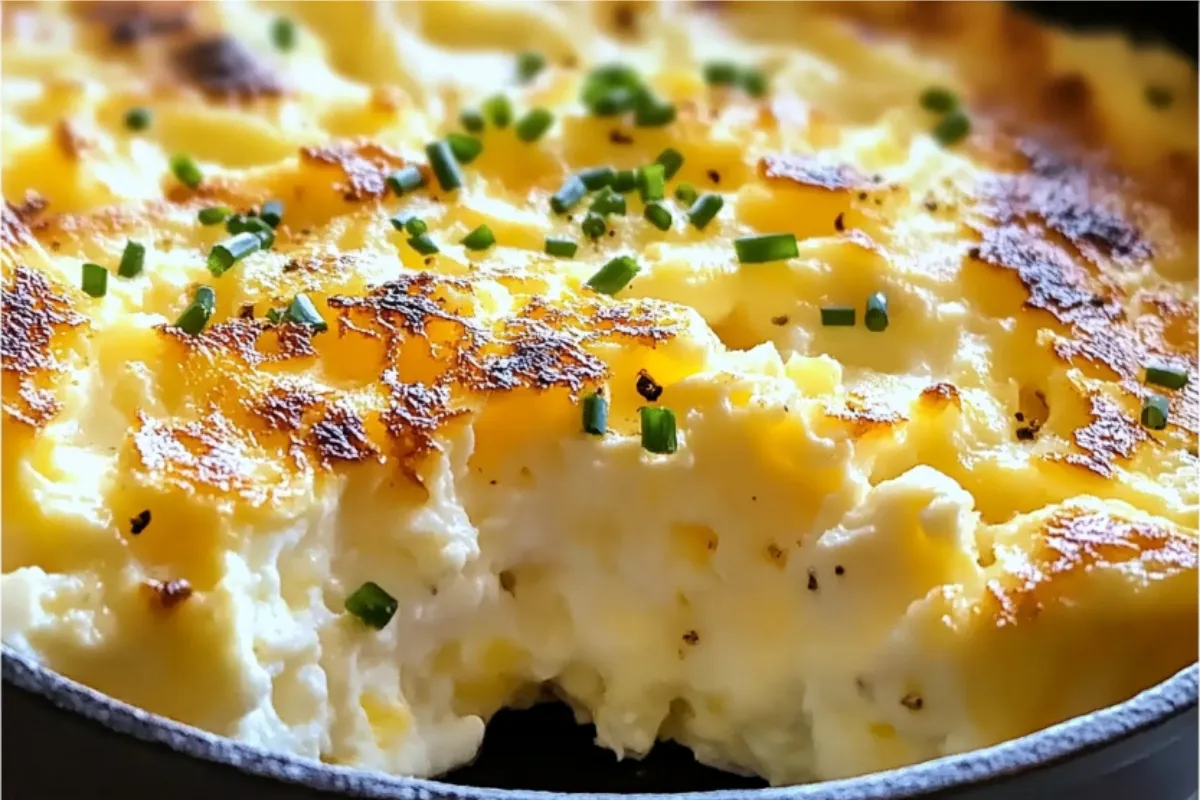Cottage Cheese Eggs might sound a little unusual, but trust me, they’re a game-changer! They’re a simple yet incredibly satisfying way to upgrade your breakfast or brunch. Basically, you add cottage cheese to your eggs before cooking them. It sounds strange, but it adds a surprising creaminess and a protein boost that keeps you full and energized all morning. For other great breakfast options, check out these salmon breakfast ideas. Whether you scramble, bake, or make an omelet, Cottage Cheese Eggs offer a delicious twist on a classic.
Why Cottage Cheese Eggs are Special
Adding cottage cheese creates a wonderfully light and fluffy texture, unlike regular scrambled eggs. Plus, you get a boost of protein and calcium. It’s a sneaky way to add extra nutrients without sacrificing flavor! You won’t even taste the cottage cheese, just enjoy extra creamy and satisfying eggs! Looking for more ways to use eggs? Explore these delicious egg recipes.
Ingredients and Equipment
For a basic batch of Cottage Cheese Eggs (serving 2), you’ll need:
- 4 large eggs: Use fresh, high-quality eggs for the best flavor.
- 1/2 cup cottage cheese: Small curd cottage cheese works best for a smoother texture. Low-fat or full-fat cottage cheese both work well. If you’re watching your sodium intake, look for low-sodium options.
- Salt and pepper to taste: Start with a pinch of each and adjust to your liking.
- 1 tablespoon milk or cream (optional): This adds extra richness and helps create a fluffier scramble. You can also use unsweetened almond milk or water.
- 1 tablespoon butter or oil: For cooking the eggs. You can substitute with cooking spray or your preferred oil.
For variations, consider adding:

- Chopped vegetables: Onions, peppers, spinach, mushrooms, and tomatoes are all great additions.
- Shredded cheese: Cheddar, mozzarella, or your favorite cheese blend. A sprinkle of parmesan cheese adds a nice salty kick!
- Herbs and spices: Chives, parsley, dill, or a pinch of red pepper flakes.
Equipment Needed
- Mixing bowl: For combining the ingredients.
- Whisk or fork: To blend the eggs and cottage cheese. A blender creates the smoothest texture.
- Non-stick skillet: For cooking the eggs.
- Spatula: For turning and scrambling the eggs.
How to Make Cottage Cheese Eggs
- Prepare the Cottage Cheese: If you prefer a smoother texture, blend the cottage cheese in a blender or food processor until smooth. This step is optional, but it helps the cottage cheese incorporate seamlessly into the eggs. If you enjoy a little texture, you can skip blending and just whisk the cottage cheese with a fork to break up any large curds.
- Whisk the Eggs: In a mixing bowl, whisk the eggs together until light and frothy.
- Combine: Add the cottage cheese (blended or whisked) to the eggs. If using, add the milk or cream as well. Season with salt and pepper. Whisk everything together until well combined. Be careful not to overmix.
- Cook the Eggs: Heat the butter or oil in a non-stick skillet over medium heat. Once the butter is melted or the oil is shimmering, pour the egg mixture into the skillet.
- Scramble: Let the eggs cook undisturbed for a minute or two, until the edges begin to set. Gently push the cooked edges towards the center of the skillet, allowing the uncooked egg to flow underneath. Continue cooking and gently scrambling until the eggs are cooked through but still moist. Avoid overcooking, which can make the eggs dry and rubbery.
- Serve: Remove the Cottage Cheese Eggs from the skillet and serve immediately.
Tips for Perfect Cottage Cheese Eggs
- Don’t overmix the eggs and cottage cheese. Overmixing can make the eggs tough.
- Cook the eggs over medium heat. High heat will cook them too quickly and unevenly. Low heat may make them watery.
- Don’t overcook the eggs. Remove them from the heat while they’re still slightly moist. They’ll continue to cook from the residual heat.
Variations
- Omelet: Prepare the egg and cottage cheese mixture as directed. Pour into a heated, oiled skillet. As the omelet cooks, add your favorite fillings like cheese, vegetables, or ham to one half. Fold the other half over the filling and cook until the cheese is melted and the filling is heated through. For some other omelet inspiration, try this article on the health benefits of eggs.
- Frittata: Preheat your oven to 375°F (190°C). Whisk the eggs, cottage cheese, and your desired additions (like chopped vegetables, cheese, or cooked meat) in a bowl. Pour the mixture into an oven-safe skillet. Bake for 20-25 minutes, or until the frittata is set and lightly golden.
- Baked Cottage Cheese Eggs: Individual baked eggs are a fun and easy variation. Preheat your oven to 350°F (175°C). Grease a muffin tin. Place a spoonful of your favorite cooked vegetables in each muffin cup. Top with the blended egg and cottage cheese mixture. Bake for 15-20 minutes or until set. Season with salt, pepper and herbs.
- Sweet Cottage Cheese Eggs: For a sweeter twist, add a dash of vanilla extract and a sprinkle of cinnamon to the egg mixture. Serve with fresh berries, a drizzle of honey, or a dollop of whipped cream. If you’re looking for other ways to incorporate cottage cheese into your meals, consider these cottage cheese bagels.
Nutritional Information
Cottage Cheese Eggs pack a nutritional punch, making them a healthy and satisfying meal. Adding cottage cheese to your eggs significantly increases the protein and calcium content compared to regular eggs. Learn more about the benefits of cottage cheese.
A serving of Cottage Cheese Eggs made with two eggs and 1/4 cup of cottage cheese provides approximately:
- Protein: Around 25 grams. Protein is essential for building and repairing tissues, and it keeps you feeling full and satisfied.
- Calcium: Around 100 milligrams. Calcium is crucial for strong bones and teeth.
- Healthy Fats: Cottage cheese and eggs contain healthy fats that are important for brain function and overall health.
- Vitamins and Minerals: Cottage Cheese Eggs are a good source of essential vitamins and minerals like Vitamin D, Vitamin B12, choline, selenium, and iodine.
Keep in mind that these values can vary slightly depending on the type of cottage cheese you use (full-fat or low-fat) and any additional ingredients you add. Overall, Cottage Cheese Eggs are a nutrient-rich way to start your day! For more healthy meal ideas, check out these healthy meal prep ideas.
FAQ
How much cottage cheese to add to eggs?
A good starting point is 1/4 cup of cottage cheese per 2 eggs. If you prefer a creamier texture and a stronger cottage cheese flavor, you can add a bit more. If you’re hesitant, start with less and gradually increase the amount until you find your perfect ratio.
How to add cottage cheese to eggs?
You can either blend the cottage cheese until smooth or simply whisk it with a fork. Blending creates a super smooth, creamy texture where you won’t even notice the cottage cheese curds. Whisking breaks down some of the curds but leaves a bit of texture. Choose the method that suits your preference!
How to make scrambled eggs with cottage cheese?
Simply whisk the eggs and cottage cheese together, season with salt and pepper, and cook in a skillet over medium heat until set. For detailed instructions, refer to the “How to Make Cottage Cheese Eggs” section above. While stovetop cooking is recommended, you can scramble these in the microwave in 30-second intervals until cooked through.
What are the benefits of adding cottage cheese to eggs?
Cottage cheese boosts the protein and calcium content of your eggs, making them more nutritious. The added protein and healthy fats help keep you feeling full and satisfied, which can be beneficial for weight management. It also adds a delicious creaminess!
Serving Suggestions and Storage
Cottage Cheese Eggs are incredibly versatile. Here are a few serving suggestions:
- Classic Breakfast: Serve your Cottage Cheese Eggs with whole-wheat toast, avocado slices, and a side of crispy bacon or sausage.
- Southwestern Flair: Top with salsa, chopped cilantro, and a dollop of Greek yogurt or sour cream.
- Healthy Boost: Add a side of sauteed spinach or roasted vegetables for extra nutrients.
- Brunch Delight: Serve alongside smoked salmon, bagels, and cream cheese for a special brunch treat.
- Quick and Easy: Wrap your Cottage Cheese Eggs in a whole-wheat tortilla for a grab-and-go breakfast burrito. If you enjoy this, you might also like these chicken salad wraps.
Get creative and experiment with different flavors and toppings to create your perfect Cottage Cheese Egg meal!
Storage Advice
Store leftover Cottage Cheese Eggs in an airtight container in the refrigerator for up to 3 days. Reheat gently in the microwave or on the stovetop over low heat. Freezing is not recommended, as it can negatively affect the texture of the eggs.
Conclusion
So, are you ready to give Cottage Cheese Eggs a try? I hope this recipe inspires you to add a healthy and delicious twist to your breakfast routine. They’re surprisingly simple to make, packed with protein, and incredibly versatile. From savory scrambles to sweet omelets, the possibilities are endless! Don’t forget to share your creations and let me know what you think. I’m always excited to hear how my recipes turn out in your kitchens!
Print
Cottage Cheese Egg
- Yield: 2 servings 1x
Description
A creamy, protein-packed breakfast or brunch option that’s quick, easy, and surprisingly delicious.
Ingredients
- 4 large eggs
- 1/2 cup cottage cheese
- Salt and pepper to taste
- 1 tablespoon milk or cream (optional)
- 1 tablespoon butter or oil
- Optional additions: chopped vegetables, shredded cheese, herbs and spices
Instructions
1. Prepare the Cottage Cheese: Blend or whisk the cottage cheese for desired smoothness.
2. Whisk the Eggs: Whisk eggs until light and frothy.
3. Combine: Add cottage cheese, milk/cream (if using), salt, and pepper to eggs; whisk well.
4. Cook the Eggs: Heat butter/oil in a skillet over medium heat. Pour in the egg mixture.
5. Scramble: Cook, gently pushing cooked edges to the center until set but moist.
6. Serve: Serve immediately.
Notes
Try variations like omelets, frittatas, or baked versions. Add vegetables, cheese, herbs, or spices for savory options, or try vanilla extract, cinnamon, berries, honey, or whipped cream for sweet variations. Don’t overmix or overcook.
- Method: Scramble, Bake, Fry (for omelets/frittata)
- Cuisine: American
Nutrition
- Serving Size: 1/2 of recipe
- Calories: 250-300
- Sugar: 2-3g
- Sodium: 300-400mg
- Fat: 18-22g
- Saturated Fat: 8-10g
- Carbohydrates: 4-5g
- Fiber: 1-2g
- Protein: 25g
- Cholesterol: 300-350mg
Keywords: Cottage cheese eggs, scrambled eggs, omelet, frittata, breakfast, brunch, high protein, healthy, easy, quick, creamy

